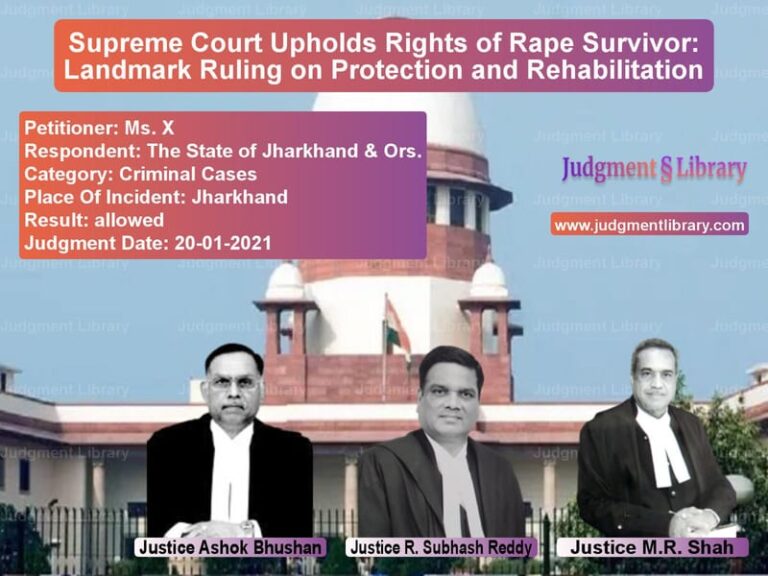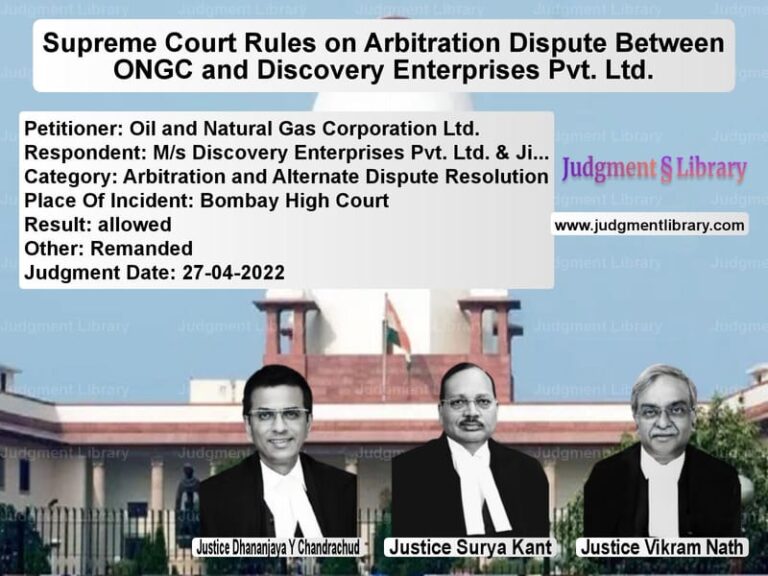Supreme Court Acquits Four Accused in Ahmedabad Riot Case Citing Lack of Evidence
The Supreme Court of India recently delivered a significant judgment acquitting four individuals accused in a 2003 riot case in Ahmedabad, Gujarat. The case, Javed Shaukat Ali Qureshi v. State of Gujarat, involved allegations of robbery, arson, and assault during a communal riot. The Court overturned their convictions, highlighting inconsistencies in witness testimony and the lack of a proper identification process.
Background of the Case
The case stemmed from events on November 7, 2003, when a mob of around 1,000 to 1,500 people allegedly engaged in violent activities in the Shah Alam area of Ahmedabad. Several incidents were reported:
- PW-1 Baldev was stopped by the mob, assaulted, and had his two-wheeler burnt.
- PW-2 Gitaben Bhailal’s necklace was snatched while she was traveling in an auto-rickshaw.
- PW-3 Hemubhai, carrying LPG cylinders, was attacked.
- PW-13 Ajay, along with a pillion rider named Mukesh, was stopped. Mukesh was later found dead in a nearby lake.
A total of 13 individuals were charged under multiple sections of the Indian Penal Code (IPC), including:
- Section 396 (Dacoity with murder)
- Section 395 (Dacoity)
- Section 307 (Attempt to murder)
- Section 435 (Mischief by fire or explosive substance)
- Section 201 (Causing disappearance of evidence)
The trial court convicted seven of the accused, including appellant Javed Shaukat Ali Qureshi, and sentenced them to life imprisonment. The Gujarat High Court later reduced the sentence to 10 years. Three of the convicted individuals had earlier been acquitted by the Supreme Court in 2018.
Legal Issues Before the Supreme Court
The Supreme Court had to determine:
- Whether the testimony of a single eyewitness (PW-2) was sufficient to uphold the conviction of Javed Qureshi.
- Whether the failure to conduct a test identification parade weakened the prosecution’s case.
- Whether accused persons who were merely part of the mob could be convicted under Section 149 IPC (unlawful assembly).
- Whether parity in acquittal should be extended to accused persons who did not appeal.
Arguments by the Petitioner
Javed Shaukat Ali Qureshi’s counsel contended:
- The sole witness (PW-2) did not previously know the accused, making her court identification unreliable.
- No test identification parade was conducted, violating standard legal procedures.
- The identification occurred two years after the incident, making it highly unreliable.
- Since similar accusations against other co-accused were discarded in 2018, Javed should also be acquitted.
Arguments by the Respondent
The State of Gujarat argued:
- PW-2 had clearly identified Javed as the person who snatched her necklace.
- As a victim, PW-2 would remember the face of her attacker.
- Even without a test identification parade, an in-court identification is legally acceptable.
- The conviction of the remaining accused had already attained finality.
Supreme Court’s Analysis
1. Reliability of PW-2’s Testimony
The Court noted that PW-2 testified two years after the incident and was subjected to significant stress during the attack. It observed:
“The identification of the appellant for the first time in the Court after a lapse of about two years becomes doubtful for more than one reason.”
Given the large mob present at the scene and the brief nature of the alleged chain-snatching, the Court found it improbable that PW-2 could reliably identify Javed.
2. Absence of a Test Identification Parade
The Court emphasized that a test identification parade is crucial when the accused is unknown to the witness. It stated:
“There was no time available to PW-2 to note the distinctive features of the appellant… It is unsafe to convict the accused based only on the solitary testimony of PW-2.”
3. Parity in Acquittal
The Court held that accused persons in similar positions should receive equal treatment. It noted that the testimonies of PW-25 and PW-26 were deemed unreliable in the 2018 judgment acquitting three other co-accused. Applying the principle of parity, the Court extended relief to accused Nos. 2, 3, and 4, stating:
“The benefit which is granted to accused Nos. 1, 5, and 13 deserves to be extended to accused Nos. 3 and 4.”
4. Convictions Based on Membership in an Unlawful Assembly
The Court ruled that mere presence in a mob does not establish individual guilt unless specific overt acts are proven. Citing Musa Khan v. State of Maharashtra, the Court held:
“It is well settled that a mere innocent presence in an assembly of persons does not make the accused a member of an unlawful assembly.”
Supreme Court’s Judgment
The Court acquitted Javed Shaukat Ali Qureshi and extended relief to accused Nos. 2, 3, and 4, directing their immediate release if not required in other cases. It held:
“To permit prosecution based on such weak evidence would be a travesty of justice. The appeal is allowed, and the appellant is acquitted.”
Implications of the Judgment
This ruling has significant implications:
- Strict Scrutiny of Eyewitness Testimony: The Court reaffirmed that testimony from a single witness must be thoroughly assessed, especially when no corroboration exists.
- Importance of Test Identification Parades: The absence of a test identification parade weakened the prosecution’s case.
- Principle of Parity: The ruling reinforced the idea that similarly placed accused should receive equal relief.
- Unlawful Assembly Charges Need Stronger Evidence: Mere presence in a mob is insufficient for conviction without evidence of active participation.
Conclusion
The Supreme Court’s judgment in Javed Shaukat Ali Qureshi v. State of Gujarat underscores the need for robust evidence in criminal trials. By acquitting the accused based on weak identification evidence, the Court has reinforced principles of fairness, individual responsibility, and due process. This case sets a crucial precedent for evaluating eyewitness testimony and procedural lapses in riot-related cases.
Petitioner Name: Javed Shaukat Ali Qureshi.Respondent Name: State of Gujarat.Judgment By: Justice Abhay S. Oka, Justice Sanjay Karol.Place Of Incident: Ahmedabad, Gujarat.Judgment Date: 13-09-2023.
Don’t miss out on the full details! Download the complete judgment in PDF format below and gain valuable insights instantly!
Download Judgment: javed-shaukat-ali-qu-vs-state-of-gujarat-supreme-court-of-india-judgment-dated-13-09-2023.pdf
Directly Download Judgment: Directly download this Judgment
See all petitions in Murder Cases
See all petitions in Attempt to Murder Cases
See all petitions in Fraud and Forgery
See all petitions in Judgment by Abhay S. Oka
See all petitions in Judgment by Sanjay Karol
See all petitions in allowed
See all petitions in Quashed
See all petitions in supreme court of India judgments September 2023
See all petitions in 2023 judgments
See all posts in Criminal Cases Category
See all allowed petitions in Criminal Cases Category
See all Dismissed petitions in Criminal Cases Category
See all partially allowed petitions in Criminal Cases Category







